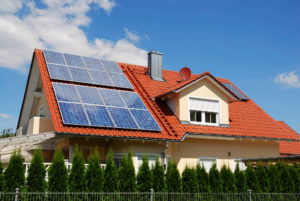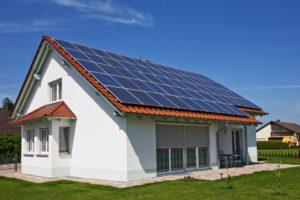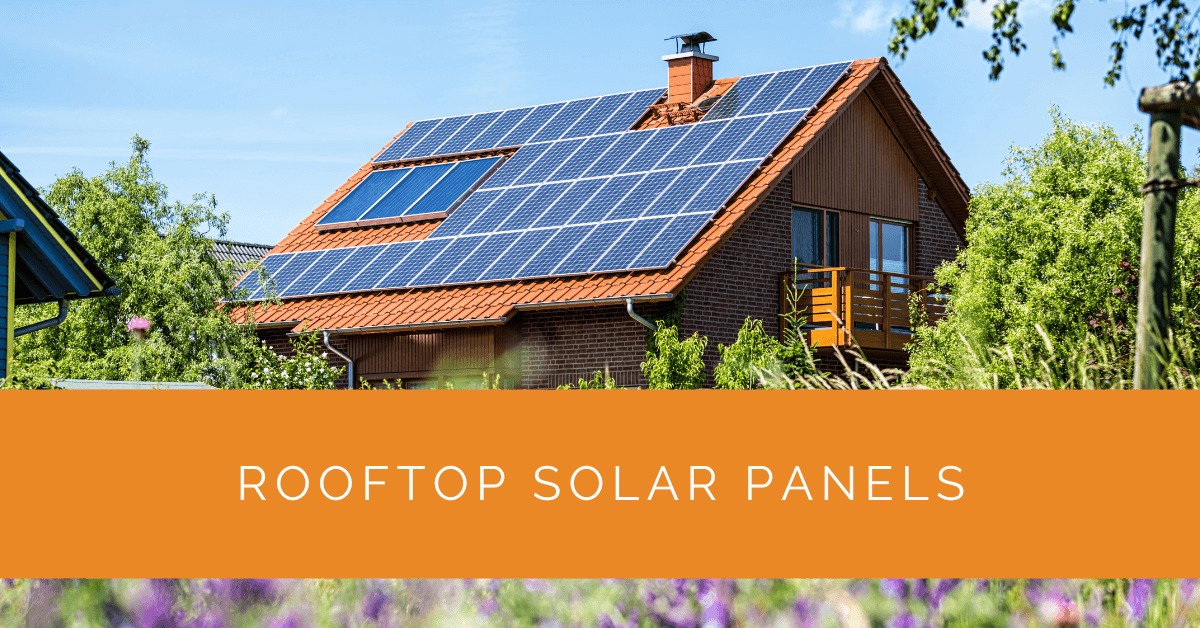Rooftop solar panels have revolutionized the way we generate electricity for our homes. By harnessing the sun’s power, homeowners can tap into clean and renewable energy sources while saving money on their electric bills. In this article, we will delve into the world of rooftop solar panels, exploring the installation process, available incentives, and the potential savings of embracing solar energy. Discover how you can transform your roof into a renewable energy powerhouse and become a part of the clean energy revolution.
Contents
- 1 Key Takeaways
- 2 Understanding Rooftop Solar Potential
- 3 The Rooftop Solar Panel Installation Process
- 4 Incentives and Savings
- 5 Case Study: Residential Rooftop Solar Panel Installation
- 6 Expert Insights From Our Solar Panel Installers About Rooftop Solar Panels
- 7 Experience Solar Excellence with Us!
- 8 Conclusion
Key Takeaways
- Installing rooftop solar panels allows homeowners to harness the sun’s power, generate clean energy, and save money on electric bills.
- Assessing solar potential is crucial before installing rooftop solar panels, considering factors such as roof orientation, shading, and structural integrity.
- By customizing system design, selecting reputable manufacturers, and taking advantage of available incentives, homeowners can maximize savings and contribute to a sustainable future.
Understanding Rooftop Solar Potential
Assessing Solar Potential
Before embarking on your rooftop solar journey, it’s crucial to assess your roof’s solar potential. Consider the following factors:
Roof Orientation and Sunlight Exposure
Evaluate the orientation and tilt of your roof to determine the optimal sunlight exposure throughout the day. Roofs facing south typically receive the most sunlight, but east and west-facing roofs can also be viable options.
Shading Analysis
Note any potential shading obstructions, such as nearby buildings, trees, or chimneys, that may cast shadows on your roof. Shading can significantly affect solar panel performance, so minimizing or eliminating shading as much as possible is important.
Roof Condition and Structural Integrity
Ensure that your roof is in good condition and structurally sound to support the weight of solar panels. Conduct a thorough inspection to identify any necessary repairs or maintenance that must be addressed before installation.
Estimating Solar Energy Production
To determine the potential solar energy production of your rooftop system, several factors come into play:
System Size Calculation
Consider your energy usage patterns and historical electricity bills to estimate the solar system size needed to offset your electricity consumption. A qualified solar installer can conduct an energy audit and recommend an appropriate system size based on your needs.
Sunlight Availability
The amount of sunlight your roof receives will impact the energy production of your solar panels. Location, seasonal variations, and local weather patterns should be considered when estimating the solar energy potential.
Solar Panel Efficiency
Different solar panel technologies, such as monocrystalline or polycrystalline, have varying levels of efficiency. Consult a solar professional to determine which panel type suits your installation and energy goals.

The Rooftop Solar Panel Installation Process
Consultation and Design
Once you have assessed your rooftop solar potential, it’s time to consult with experienced solar installers to design a system that suits your needs. The installation process typically involves the following:
Energy Audit and System Customization
An energy audit will help determine your energy usage patterns and recommend the ideal system size to meet your needs. Based on this information, solar installers can customize a system design that maximizes energy production and fits seamlessly into your existing roof layout.
Manufacturer Selection and Equipment
Choose a reputable solar panel manufacturer known for high-quality and reliable products. Consider panel efficiency, warranties, and compatibility with other system components. A knowledgeable installer can guide you in selecting the best equipment for your installation.
Permitting and Installation
Before the physical installation begins, the solar installer will handle the necessary permits and paperwork for your rooftop solar project. Once the paperwork is in order, the installation process typically follows these steps:
Mounting System Installation
Securely attach the mounting system to your roof, ensuring proper alignment and structural integrity. The mounting system provides the foundation for the solar panels and ensures they are securely fastened to the roof.
Panel Placement and Wiring
Carefully position the solar panels on the mounting system, optimizing their exposure to sunlight and ensuring sufficient spacing for airflow and ventilation. The panels are then wired together and connected to an inverter, which converts the direct current (DC) electricity generated by the panels into alternating current (AC) electricity usable in your home.
Electrical Connection and Grid Integration
The inverter is connected to your home’s electrical system, allowing the solar-generated electricity to power your household appliances and feed any excess energy back into the grid. A qualified electrician will ensure the connections are made safely and comply with local electrical codes and regulations.

Incentives and Savings
Available Incentives
Installing rooftop solar panels offers a range of incentives to homeowners:
Federal Tax Credit
Through the Federal Investment Tax Credit (ITC), eligible homeowners can receive a tax credit equal to a percentage of their solar installation costs. The ITC offers a 30% tax credit for systems installed between 2022 and 2032. This is an increase from the previously planned tax credit rates. Starting from 2033, the tax credit will decrease, decreasing to 26% in 2033 and further reducing to 22% in 2034. No maximum limit on the amount can be claimed under this credit. Consult a tax professional to understand the specific requirements and eligibility criteria.
State and Local Incentives
Many states and local jurisdictions offer additional incentives such as rebates, grants, or low-interest loans to encourage residential solar installations. Research the incentives available in your area to maximize your savings and make going solar even more affordable.
Net Metering Programs
Explore net metering programs offered by your utility company. With net metering, any excess electricity generated by your solar panels can be fed back into the grid, and you may receive credits on your electricity bill for the surplus energy.
Financial Savings
Embracing rooftop solar panels can lead to significant financial benefits over the long term:
Electricity Bill Savings
Generate your electricity and reduce your reliance on the grid. Using the solar energy generated by your panels can offset a portion or even eliminate your monthly electricity bills, resulting in long-term savings.
Return on Investment
Installing rooftop solar panels is an investment that can yield returns over time. With the savings on your electricity bills and the potential increase in your property value, your solar system can provide a solid return on investment.
Increased Property Value
Studies have shown that homes equipped with solar panels often have higher property values and can attract potential buyers who prioritize sustainable and energy-efficient homes.
Case Study: Residential Rooftop Solar Panel Installation
Background
In Lancaster, Pennsylvania, we embarked on a residential solar panel installation project to help a homeowner transition to renewable energy. The goal was to reduce energy costs and increase property value while contributing to a sustainable future.
Project Overview
The homeowner, keen on reducing their carbon footprint, contacted Solar Panels Network USA for a comprehensive solar energy solution. After an initial consultation, we conducted a thorough assessment of the property to determine its solar potential.
Implementation
Assessing Solar Potential
We started with a detailed assessment of the roof’s orientation, tilt, and any potential shading issues from nearby trees and structures. Our analysis showed that the roof’s southern exposure was optimal for maximum sunlight throughout the year.
System Design and Customization
Based on the energy audit and historical electricity usage, we designed a system that would meet the household’s energy needs. We selected high-efficiency monocrystalline panels known for their superior performance and longevity. The system was designed to accommodate future expansions, considering the family’s potential increase in energy consumption.
Permitting and Installation
Our team handled all the necessary permits and paperwork, ensuring compliance with local regulations. The installation process included mounting the panels securely to the roof, optimizing their placement for maximum sun exposure, and ensuring proper airflow for cooling. We wired the panels to an inverter, converting the DC power generated into AC power for home use.
Integration with the Electrical Grid
We integrated the system with the home’s electrical grid, enabling net metering. This allows the homeowner to feed excess electricity back into the grid, earning credits on their utility bill for the surplus energy produced.
Results
The installation was completed efficiently, with minimal disruption to the household. The new solar energy system not only met but exceeded the homeowner’s expectations, significantly reducing their electricity bills. The system’s performance monitoring showed optimal energy production, even during the winter months when sunlight is less intense.
Financial Incentives and Savings
By taking advantage of the federal tax credit and state incentives, the homeowner reduced the overall cost of the solar installation. The financial savings were immediate, with a substantial decrease in monthly energy expenses.
Summary
This case study in Lancaster, Pennsylvania, demonstrates how a well-planned and expertly executed solar panel installation can transform a residential property. By assessing the solar potential accurately, customizing the system design, and leveraging available incentives, we helped the homeowner achieve significant energy savings and contribute to a greener environment. At Solar Panels Network USA, we are committed to providing top-quality solar solutions tailored to meet the unique needs of each client.
Expert Insights From Our Solar Panel Installers About Rooftop Solar Panels
Rooftop solar panel installation is more than just setting up panels; it’s about optimizing every detail to maximize efficiency. Proper orientation and minimizing shading are key to harnessing the sun’s full potential.
Senior Solar Installer
Choosing high-quality solar panels is crucial for long-term performance and savings. We always recommend panels with the best efficiency ratings and warranties to ensure durability and return on investment.
Lead Solar Engineer
One of the most rewarding aspects of my job is seeing homeowners save significantly on their energy bills. By leveraging available incentives and designing custom systems, we help our clients achieve energy independence.
Residential Solar Specialist
Experience Solar Excellence with Us!
Trust in Solar Panels Network USA, where our seasoned experts deliver top-quality solar solutions for homes and businesses nationwide. With a legacy of countless successful installations and a commitment to sustainable energy, we’re your reliable partner in the solar journey. Ready for a brighter, eco-friendly future? Call us now at (855) 427-0058 and harness the power of the sun!
Conclusion
Rooftop solar panels allow homeowners to generate clean and renewable energy from their rooftops. By understanding your rooftop’s solar potential, customizing your system design, and taking advantage of available incentives, you can significantly impact your electricity bills and contribute to a greener future. Embrace the power of solar energy, and discover the benefits of installing rooftop solar panels on your residential property. Start your journey to a cleaner and more sustainable future today!
About the Author
Solar Panels Network USA stands at the forefront of solar energy solutions, driven by a team of seasoned solar engineers and energy consultants. With over decades of experience in delivering high-quality solar installations and maintenance, we are committed to promoting sustainable energy through customer-centric, tailored solutions. Our articles reflect this commitment, crafted collaboratively by experts to provide accurate, up-to-date insights into solar technology, ensuring our readers are well-informed and empowered in their solar energy decisions.

